- Home
- Maya Corrigan
By Cook or by Crook Page 3
By Cook or by Crook Read online
Page 3
She called her cousin and left messages on her cell phone and landline. Monique had no reason to stay home, her husband having taken their young children to visit his parents. Val also tried to reach Bethany O’Shay, the tennis team’s youngest member and Nadia’s recently dumped doubles partner. Bethany didn’t pick up either.
Next she phoned Tanisha, the college student who’d opened the café this morning, and coaxed her into staying until closing time. Val didn’t tell her about Nadia’s death, but she should tell Tanisha’s mother, Althea, a member of Nadia’s tennis team. Althea could break the news to her daughter. “I’d like to talk to your mom. Is she at home now or in her office?”
“She went to Cumberland today to do something for a client. She’s going to spend the night there and drive back tomorrow.”
Val put the phone down, glad to postpone delivering bad news. The burning smell had gotten stronger. She raced to the kitchen. No sign of Granddad. He must be in his bedroom. A mixing bowl, eggshells, and globs of batter decorated the counter near the stove. Smoke seeped from the oven door. She turned on the exhaust fan over the stove and backed away, coughing.
She snatched a dish towel from the counter and held it over her nose. It felt wet and sticky, and had a familiar sweet smell. Just what she needed—a cake batter facial. She opened the oven. The blast of heat nearly knocked her over. Smoke billowed out. Her eyes burned.
Granddad appeared in the doorway. “What are you doing, Val? You smoked up the whole place.” He coughed and wheezed.
All she needed was for him to collapse gasping for breath. “Get out of the house. Now.”
She put on oven mitts, reached inside the hot cavern, and pulled out a large pan crusted with a black substance, charred remains of a baking project gone awry. With the pan at arm’s length, she ran out the side door and set it down on the driveway.
Back in the house, she opened the windows in the study, the sitting room, and the dining room. Luckily her grandfather’s bedroom door was closed against the smoke. She left it that way, went back to the kitchen, and checked the stove. No wonder it was giving off the heat of an inferno. The oven was set to more than five hundred degrees.
She turned it off and studied the mess on the island counter. Thick yellow liquid dripped from her mixer’s blades. An empty box of cake mix and one of instant vanilla pudding, a tin of salad oil, and a bottle of rum sat on the counter—the ingredients for her Foolproof Rum Cake. Now she’d have to rename that recipe.
Her eyes stung from the smoke. She joined her grandfather on the front porch and sat next to him on the glider. “Rum cake, huh? How did the batter get the better of you?”
He peered at her over his reading glasses. “I mixed it for two minutes, just like the recipe said, and went to turn the mixer off. The danged thing zoomed into high speed. Surprised me so much, I dropped it.”
“The recipe calls for a Bundt pan, not a roasting pan.”
“How am I supposed to know what a Bundt pan is? I picked out a pan that looked the right size. The batter coated the bottom of it.”
And the thin layer burned fast. “The recipe also says to set the oven at three hundred twenty-five, not five twenty-five.”
“I couldn’t tell if the first number was a three or a five.”
“Next time you can’t tell, go for the lower temperature. What made you bake a cake this morning? You’ve never baked anything before.”
He twiddled his thumbs and studied them. “I had to start somewhere. It’s time I learned to cook for myself now. Who knows how long you’ll be staying here?”
His sudden interest in cooking still struck her as odd. “I’ll teach you to cook, but we do it together. Then I can explain things, like what a Bundt pan is.”
“Okay, but no more than five ingredients. Otherwise, there’s too much to keep track of.” He patted her hand. “Sorry for the mess in the kitchen.”
“Don’t worry about it. It’s better than the last kitchen I saw.” With a murdered woman in it. “You made me forget, for a little while, something I thought I’d never get out of my mind.”
She buried her head in his shoulder. The tears she’d corked up since finding the body flowed out. Between sniffs, she told him about finding Nadia stabbed to death. She could tell from his shallow breathing and his tense arm around her shoulder that the news upset him. She skipped over the gruesome details about the murder weapon.
“Poor thing.” He stroked her hair. “You should take the rest of the day off.”
“It’s better if I keep busy. Chief Yardley asked me to stop by the police station. I’ll clean up the kitchen before I go. By the way, he sends his regards.”
“Good man. He’ll catch the murderer.” Granddad eased himself out of the glider. “I’ll help you in the kitchen.”
He wasn’t much help, but she was grateful for the company. Her morning would have been much worse if she’d come back to an empty house with nothing to do but brood over Nadia’s murder. By putting the kitchen in order after Granddad’s cooking disaster, she kept one form of chaos at bay.
Before leaving for the police station, Val tried her cousin’s home and cell phone numbers. Still no answer. Had Monique found out about Nadia’s death? Could she have panicked and run to avoid police questioning?
Chapter 3
Deputy Holtzman trained his raptor eyes on Val. “You rang the bell at Nadia Westrin’s house, got no response, and walked in. You usually barge into people’s homes like that?”
Was that the fourth or fifth hostile question he’d asked? Val had lost count. “She asked me to meet her there at seven. When she didn’t come to the door, I thought I should check on her. I’d want someone to do the same for me.”
Holtzman’s interviewing technique lacked just one ingredient of a B-movie interrogation—the suspect sweating under hot lights. Val would welcome hot lights in this tiny room without a window but with a vent that blew polar winds at her. She leaned down to rub her knees and calves. Her short skirt suited the heat outdoors, but not the frigid air trapped under the table.
Holtzman flipped to a new notebook page. “This morning at the victim’s house, you must have thought about who’d want to murder her. Any names come to mind?”
Translation: finger someone else and you can get out of the hot seat, or rather, the cold seat. “I just thought it was a pretty strange way to kill someone.”
He sat immobile like a bird of prey ready to pounce, eyes glued on her. “Oh? How would you kill someone?”
She clamped her lips together. Some questions didn’t deserve answers.
He leaned toward her. “Would you make it look like an accident?”
Val flinched as if a dentist had just hit a nerve with his metal probe. “What are you driving at?”
His eyes narrowed as he studied her. “Driving at? Good word choice. I’m thinking about a car accident that wasn’t accidental.”
Val stiffened and felt a tremor run through her. No one had ever blamed her for the crash that nearly killed the famous Chef Henri, no one except the great man himself. The police and even the insurance company had chalked it up to bad weather and road conditions. Yet Val didn’t feel blameless, wondering if the black ice on the road reflected her anger at the chef for rebuking her publicly. Maybe she could have steered out of the skid if she hadn’t wanted to get back at him. She gripped the seat of the metal chair to stop her hands from shaking.
Holtzman pinned her with his steady look. “You know anything about the hit-and-run?”
“Hit-and-run?” Her voice sounded faint as if coming from inside a tunnel.
“A month ago a man was struck by a car on a deserted road near here.”
Val’s fingers relaxed. She’d misunderstood. He was talking about someone else’s accident not hers. “What’s that got to do with Nadia’s murder?”
“A suspicious death and a murder within a few weeks of each other, that’s rare in this area.”
“That’s the only connection bet
ween the hit-and-run and Nadia’s murder?”
“How’s this for a connection? You find a woman you know horrifically murdered, and you don’t show much emotion. Then I bring up the hit-and-run and get the strongest reaction I’ve seen all morning.”
And you’ll never know why I had it. “Are you accusing me of something? Because if you are, I want a lawyer.”
“You have the right to counsel if you think you need it.” Holtzman turned off the tape recorder, crossed the room, and opened the door. “Sit tight, Ms. Deniston. We want your fingerprints.”
She jumped out of her chair. “Fingerprints? Why?”
“You were all over the crime scene. We need to differentiate your prints from the others we find there.”
Of course. She would have realized that if he hadn’t made her nervous by treating her like a suspect. Did he grill her because the murder weapon made every tennis player a suspect? She paced the small room, trying to warm up. Holtzman had intimidated her, and she had no motive for murdering Nadia. Someone with a motive would feel even more intimidated.
Fifteen minutes later, with the fingerprinting over, she left the police station and ran into the chief in the parking lot.
“You got your color back, Val. You doing okay?”
“Better than this morning. Has Nadia’s family been notified?”
“I talked to her ex, Joe Westrin. Her only kin are elderly and don’t live in the area. He’s contacting them.”
Sad. Almost no family to mourn her. “I hope you catch the killer fast. If there’s anything I can do to help, let me know.”
“Keep your ears open at the club. You may hear something people won’t tell us.” He went inside the converted farmhouse that served as police headquarters.
Val climbed into her car and called her cousin. No answer. Her stomach felt hollow. She would fortify herself with a good meal—crab cakes on potato rolls for her and Granddad. After lunch she’d drive to her cousin’s house if she hadn’t heard from her by then.
On the way home she stopped in the town’s historic district to buy lunch ingredients. On either side of the main drag, frame houses built by original settlers had morphed into gift shops, antique stores, and B&Bs. Val found a parking space two blocks off Main Street. Now that school was out, day-trippers ambled through the town and lined up at the Bake Shoppe—tots in sneakers with flashing lights, teens in flip-flops, grown-ups in boat moccasins or all-terrain sandals. Would a murder hinder or boost tourism in the town?
She bought a small container of crabmeat at the market and snagged the last rolls in the bakery. To avoid the crowd on Main Street, she took a different route back to the car, a side street with shops she rarely visited. The display window of Personali-Tees featured customized shirts, towels, and aprons. She detoured into the shop and ordered a bib apron personalized for her grandfather. If she chose a stock color, she could pick it up tomorrow. Perfect.
Farther along the same street, she sniffed a fried food odor so strong it made her stomach turn. She passed the diner, spotted Luke through its storefront window, waved, and walked on.
“Val, wait up,” he called out from the diner entrance.
She retraced her steps. “Hey, Luke.”
The last time she stood near him, by firelight on Nadia’s lawn, she didn’t get a good look at his face, but now she noticed how much he’d filled out since high school. Fleshy cheeks padded the bones that used to be prominent. The gaunt young man had turned solid, but he still used the same cologne. Canoe. It tickled her nose and her memory. For a moment she felt like a teen in love, more with the idea of love than with Luke.
He searched her face as if waiting for her to say something. “Lot of action at Nadia’s place this morning. Cop cars from the town, the sheriff, state police. Her neighbor said you were there earlier. Is Nadia dead? That’s what we heard.”
Despite the chief’s efforts, someone had noticed Val there. Probably Irene Pritchard.
Val took a deep breath. “You heard right. The police should be making an announcement soon if they haven’t already. They’re treating it as a murder.”
“Murder?” He ran a hand through his close-cropped brown hair. “Jeez. I was afraid something bad would happen to her. That fire the other night must have been a warning. I wonder if she knew it.”
“If she saw it as a warning, she would have called the police.”
Luke rubbed the back of his neck. “Or I could have called them instead of making racket jokes.”
“Don’t blame yourself. It was her place and her decision whether to call the police.” Absolving Luke might help Val shake her own guilt.
He tilted his head toward the diner. “How ’bout lunch? On the house.”
“Not today, thanks.” She glanced through the diner’s storefront window. No customers inside, only a tall, broad young man setting a table. She recognized him from Nadia’s Memorial Day party. “That’s Irene Pritchard’s son, isn’t it? Nadia bragged about getting him his first job.”
“Yeah, Jeremy. I hired him on her say-so. He grew up next door to her.” Luke lowered his voice. “The kid’s gonna be broken up when he hears about her.”
The “kid,” though in his twenties, was awkward and shy like a teen. “It was nice of Nadia to help him out.”
“She came across as a hardnose, but not with Jeremy. She even talked me into renting the room over my garage to him so he could cut the apron strings and learn to live on his own.”
Some people might call that meddling, including the woman with the apron strings. Val held up her bakery bag. “I’d better head home with this. Granddad’s waiting for lunch.”
“Let’s get together for a drink sometime. The dockside restaurant has a new patio overlooking the water.”
“Uh . . . okay.” She smiled, unsure whether he had a romantic encounter or a friendly chat in mind. Maybe he didn’t know, either. “See you, Luke.”
She hurried to her parking space. A blast of heat hit her when she opened the car door. She’d rather walk half a mile home than ride in an oven. The car might cool off in another hour, once the sun went behind the tree. She cracked the windows open and shut the door. On the way home she ambled along shady back streets, avoiding the diner.
Granddad greeted her from the glider on the front porch. “How did it go with the police? Where’s your car? Did they impound it?”
She laughed and leaned against the porch railing. “It went okay. I left the car in town. Needed a walk to clear my head. Did Monique call while I was gone?”
He shook his head. “You look worried.”
“I’ve been trying to reach her all morning to tell her about Nadia.” An hour ago she’d feared her cousin had run away. Now a worse scenario popped into her mind. “One woman in my tennis group murdered, another one not returning phone calls. I’m more than worried.”
“Don’t be. Monique’s out and about somewhere, taking care of Number One, just like her daddy did. She’ll call you when she gets around to it.”
Val always defended her cousin against Granddad’s bias, a holdover from his rift with Monique’s father. “She would answer her cell phone if she were out. I should go to her house, but I see myself ringing her doorbell like I rang Nadia’s, turning the doorknob, going inside, and finding her on the floor—” Val broke off with a shudder.
Granddad eased himself out of the glider. “I’ll drive you to her house after lunch. If anything looks suspicious when we get there, you can wait in the car while I check it out.”
What if Monique had been murdered like Nadia? Val couldn’t let Granddad see anything like that. He might have a heart attack. “I’ll go myself later. Want to help me make crab cakes? Only five ingredients. Your first cooking lesson.”
“I’ll watch. I’ve done enough cooking for one day.” He followed her into the kitchen.
She washed her hands and took an egg from the fridge. “Would you get the flour, olive oil, and Old Bay seasoning from the pantry?”
; He lined up the ingredients on the counter. “While you were gone, I made a deal with a painter who’s going to do the upstairs bathroom and hall. He cut his price way down. All you gotta do is make the salads and side dishes for his Fourth of July party.”
“You’re escalating. Last time I only had to bake a cake.” She pried the top off the plastic container of crabmeat, dumped the crab into a bowl, and checked it for bits of shell. “The IRS frowns on unreported income from bartering. The painter and I should both report the value of our services as income on our tax forms.”
“He’s offered me a senior citizen discount. You’re just doing your grandfather a favor. The IRS won’t come after us for that. Loosen up, Val. Bend the rules once in a while.”
Always the wheeler-dealer, he got a kick out of bending rules, bargaining, and even exploiting his own granddaughter. At least she was collecting references for her cooking services, if not money. And she could honestly tell her mother that he was fixing up the house—in his own wily way.
Val mixed the crabmeat with egg, flour, and Old Bay seasoning. She picked up a hunk and shaped it into a patty. The phone rang. She looked at the crabmeat clinging to her palms. “Would you get that? If it’s Monique, I’ll wash my hands and talk to her.”
He left the room to answer the phone. He’d never bothered to put an extension in the kitchen. Val didn’t bother either, using her cell phone more often than the landline.
She put the patties in the freezer to harden before frying, glanced into the hall, and saw her grandfather still on the phone. He’d never chat that long with Monique. Maybe he was negotiating with another contractor.
Fifteen minutes later he returned to the kitchen as she was browning the crab cakes. “That was your tennis partner from Sunday night calling. Gunnar. He asked for you, but I told him you were up to your elbows in crabmeat.”
She nearly dropped the spatula. “You talked to him all that time?”
“Figure I’d vet him while I had him on the phone. His voice reminds me of Richard Burton’s but with an American accent. We talked fishing. I asked him to drive you to Monique’s, told him you’d point out the good fishing spots on the way. He’s coming by in half an hour.”

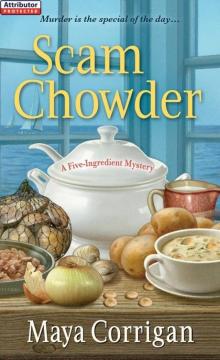 Scam Chowder
Scam Chowder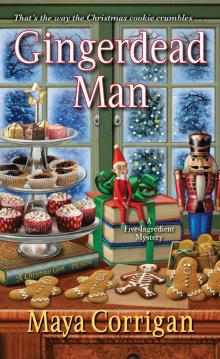 Gingerdead Man
Gingerdead Man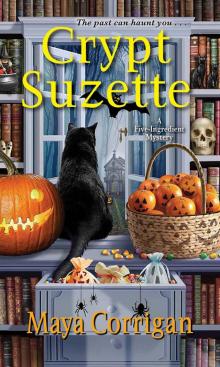 Crypt Suzette
Crypt Suzette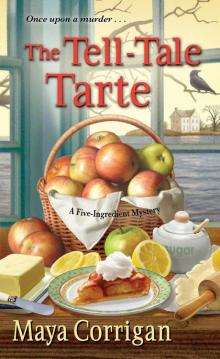 The Tell-Tale Tarte
The Tell-Tale Tarte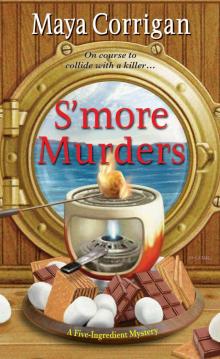 S'more Murders
S'more Murders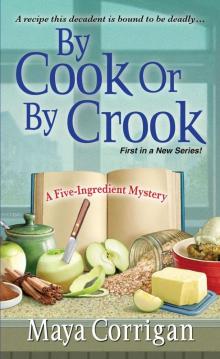 By Cook or by Crook
By Cook or by Crook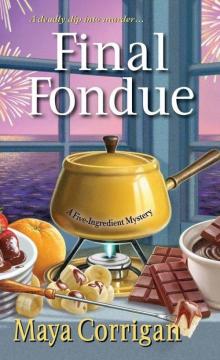 Final Fondue (A Five-Ingredient Mystery)
Final Fondue (A Five-Ingredient Mystery)